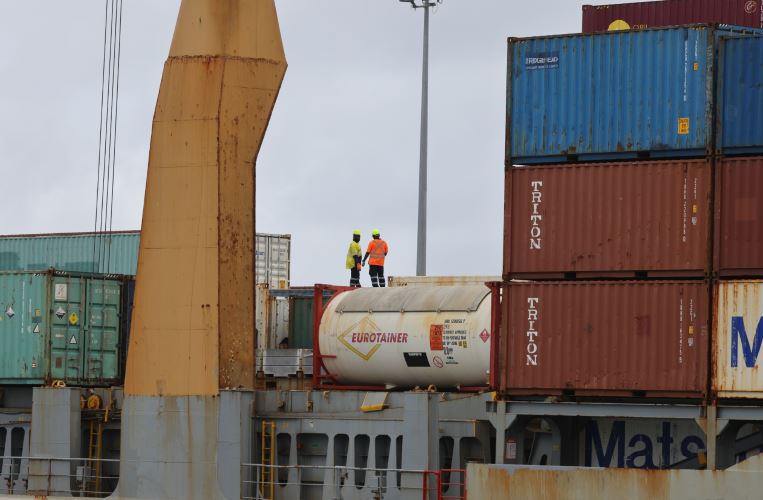Economist hopeful for Cook Islands growth
Friday 27 January 2023 | Written by Matthew Littlewood | Published in Economy, National

Fuel tanktainers onboard a cargo vessel at Avatiu harbour. 22121801
Ministry of Finance and Economic Management’s top economist says the Cook Islands is ‘on the comeback trail – but with some caveats’.
MFEM’s director of economic planning Tristan Metcalfe spoke at the Global Breakfast Update on Thursday at The Edgewater Resort and Spa.
He told the audience that early data for the year was promising.
“We’re on the comeback trail—but with some caveats,” Metcalfe said.
“Our recovery is looking okay at the moment.
“The New Zealand market has been stronger than what was expected.”
Metcalfe said business turnover in nominal dollars had returned to pre-Covid-19 levels, but “the downside is rising costs”.
“Whilst income has come back to pre-Covid-19 levels, costs are about 15 per cent higher. And most businesses have had to wear the increases,” he said.
Metcalfe said although inflation remained high, especially in New Zealand, there was some hope that it would “plateau” later in the year, while diesel prices were also expected to drop.
“A lot will depend on what happens in the Ukraine, that’s the biggest uncertainty surrounding fuel prices, but prices are slowly and cautiously trending downwards,” he said.
Metcalfe said along with the rising living costs, employing and retaining staff remained a big issue in the Cook Islands economy.
“Ministry of Foreign Affairs and Immigration (MFAI) issued 420 work permits between April 1 and December 31, 2022 for foreign workers in the restaurants and accommodation sector. Some of this is churn as some workers have come in and left, while other workers have also left the sector. But retaining staff was already a challenge pre-Covid, after Covid-19, it’s become harder,” he said.
“Employers in other sectors were seeking around 302 people. MFAI issued 307 work permits for other sectors between April and December, 2022. This suggests gaps are closing, though pressures on retention are still very present.”
Metcalfe said in the coming months businesses would need to “strap themselves in” and prepare for low visitor numbers.
“In terms of Government, we’re moving into a more fiscally constrained environment. Through Covid-19, we had the businesses support subsidies. Without that, the economy would have collapsed. Now it’s come to the point where the government needs to start to cut its cloth,” he said.
Metcalfe said pre-Covid, Government debt was below 20 per cent of GDP (gross domestic product), now it was closer to 45 per cent of GDP, and various “repayment holidays” would be finishing soon.
“We’re entertaining a more fiscally constrained environment over the short term,” he said.
However, Metcalfe said over the medium term, the Cook Islands was looking at more growth thanks to the arrival of more flights from Air New Zealand and Jetstar and the entrance of Hawaiian Airlines into the market.
“Tourism is what we do well,” he said.









































